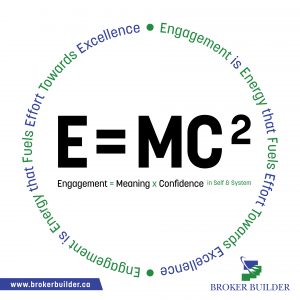A 2013 Gallup Study regarding employee engagement offered some depressing results for both employees and employers. The study found that 70% of employees reported feeling disengaged from their jobs. That can’t sit well with either group. It’s not like employees are waking up looking forward to feeling bad about their work experience. Nor can employers feel enthused about their zombie-like employees trudging through their work days.
Diving deeper into the sad 70%, we’re informed that almost 75% of these are “just” disengaged while the other 25% are actively disengaged. The article highlights some of the costs that follow the disengaged. Lost productivity, poor customer service, higher use of sick days, and being negative influences on colleagues are clear consequences that drag down the contributions of the disengaged. Those that are actively disengaged present the additional risk of being downright nefarious. They may actively try to thwart business efforts through theft, for example. There’s also a strong correlation between employee disengagement and turnover. The more disengaged, the higher the staff turnover. The study details other negative financial performance metrics experienced by companies with poor staff engagement.
These are depressing numbers. Even though the study is now seven years old, we’re guessing things haven’t changed, on average, to improve engagement. Cynical employers amongst us may ruefully acknowledge these dismal figures and even accept this as expected. We can’t trust workers to work well unless supervised and in fear of a big strong stick. We need more old school catholic teachers in management that will impose their will to discipline and cajole workers to perform. Other more humanist employers may offer that we need tastier carrots. Perhaps, higher compensation, better bonuses, more benefits? With either of these options, the cure for employee morale, engagement, motivation lies outside of the individual and with the employer. We’d like to introduce a different perspective for consideration.
Engagement is a good thing. In fact, it could be considered essential. Engagement is, applying a lyric of Ed Sheeran’s, “the fuel which fans the flame”. To be successful in any endeavor, incredible amounts of time and effort must be spent. Engagement is the energy source which powers the flame of success or progress in one’s chosen endeavor. This is the case whether one is pursuing progress in sport, a relationship, business, etc.
Sadly, as the Gallup study suggests, we may all too well recognize what disengagement looks like. Being around it isn’t invigorating. Worse, it can be contagious. We want to run from those that say “why bother”, shrug their shoulders then offer, “who cares?” when tasked with something. As much as we want to run away from those that are disengaged, we’re drawn to those that are engaged. We may call this idea many things from being present, turned on, keen, motivated, committed, interested, focused, or engaged. We have all seen this experience on some level and most of us have likely felt it, too. We’ve either been a spectator, a coach, a parent, or participant watching ourselves or others. We’ve seen those that seem to be switched on. They are fully focused on what’s in front of them. Their eyes are locked on learning, their body posture is leaning in, their ears lilted to listening, and their minds fully absorbing lessons. We see it in toddlers learning to walk. Their focus is absolute. They are intent on their actions. They are fully engaged in the activity. Even though they may not meet with immediate “success”, they are engaged and their efforts seem enjoyable.
As much fun as watching those achieving excellence is, the reward for our own excellence should drive our desire to develop it. The path to progress is long and difficult. Finding fuel that will keep us moving forward is what we’re after. Most motivation is fleeting. We hear a song, attend a seminar, watch a video, or read a book and feel wonderful after and think about all the great things we’re going to accomplish. Most of the time we talk about how we’re fired up about getting started on our big goal next week or when I can get a hold of my schedule. If we’re lucky, we start taking some action and working towards something only to give up after a few attempts coming up with any one of a litany of lame excuses. On other occasions, we’re passively waiting for inspiration. Gazing with our glassy eyes out the window wondering when we will be filled with the motivation muse. We think our engagement is dependent on incentives either fear or reward based.
Back in 2013, In a sport context in which I was coaching, I crafted an “equation”. The goal was to offer a useful framework to think of motivation. The hope is that the equation helps us both help ourselves as well as others take responsibility for managing our own motivation. It was framed as “E = MC2” to mirror Einstein’s Theory of Relativity intended to make it memorable. E = MC2 became The Engagement Equation where Engagement is considered motivation, internal drive, or whatever word we want to use to reflect something that helps get us going. Our engagement is the result of three separate variables:
M is this Matters to Me. (Does this matter to me?)
We have two Cs which both represent a form of Confidence.
Confidence in Self (Do I believe I can achieve this?), and
Confidence in a System (Do I believe this approach works?).

The key is that all three are needed to ensure highest levels of engagement. As the formula involves multiplication, it doesn’t matter the order in which these elements are developed. We can work to develop our interest and commitment to an activity or our self belief, it doesn’t matter. If I believe something matters, but I don’t believe I can accomplish it, my willingness to try and engage is limited. Separately, if I believe I can do this, but I don’t really care about it, my willingness to engage is also compromised. Even if I am deeply interested in something and I have confidence that I can accomplish it, my progress will remain limited where I have doubts about the system I’m pursuing. Disengaged or those struggling have likely answered “No” to one or more of these questions. The power of my engagement when I am moved by both the meaning of the activity coupled with my confidence to accomplish is substantially greater.
If we watch one of the “People are Awesome” videos, we see that we have a seemingly unlimited number of things we can deem as important to us. Each activity in these videos matters very much to the person doing it. It consumes their attention and their energies for days, weeks, months, and years. They derive great pleasure from working at improving at the area that matters to them. Their actions devoted to improving both reflect and cultivate a strong sense of self belief. They believe with their efforts they can improve, so they work hard.
US golfer, Bryson DeChambeau, has rapidly ascended in worldwide rankings. He has won several tournaments in recent years. In an interview for Golfworld magazine in April 2016 written by Jaimie Diaz, Bryson evidences each component of The Engagement Equation.
Diaz notes that DeChambeau “knows he has a presence, and he has a mission.” DeChambeau is clear on why golf matters to him. Diaz writes, “His (DeChambeau’s) most stated goal is to influence the game’s multitudes and bring more people to golf. He has been inspired by two meetings with Arnold Palmer, whose example of giving back on a large scale he expects to emulate.” DeChambeau is crystal clear as to why golf is important to him.
Apparently he has a quirky ability to write his full name backwards using his non-dominant hand. When asked why or how he is able to accomplish this skill, Bryson’s response perfectly reflects complete confidence in himself. His self-belief shines with, “It’s not talent, it’s just practice. If I wanted to learn Arabic or Russian, I could. Or tie my shoes in a new way, I could. Why? Dedication. I’m not really smart, but I’m dedicated. I can be good at anything if I love it and dedicate myself. And I love history. I love science. I love music. I love golf. I love learning. I love life. I love trying to be the best at anything and everything.”
Finally, DeChambeau is a serious student of the sport. He has customized his approach to the game. He has worked with others to develop a system for his personal skill development. For example, he has the shaft lengths of his irons matched equally across clubs to match that of a standard six iron. Additionally, the club heads are all equally weighted and the loft for each has been adjusted for his purposes. He further customizes his equipment with oversized grips which impose a limitation on his biomechanics which he is convinced allows him to repeat consistently his swing path. He may be the only person on the PGA Tour doing such. Rory McIlroy observed, “Bryson has real control of his golf ball. He has real belief in his method.” McIlroy’s observation captures DeChambeau’s confidence in his system. DeChambeau is confident he is on the right path of progress. His continued commitment to that program combined with time has helped him become the longest hitter on the tour and a world rank of 7th. Golf’s importance to DeChambeau coupled with his complete confidence in himself and his approach encapsulate his Engagement. His unmatched work ethic is fueled by this combination.
Our Engagement is the product of the Meaning we assign something coupled with confidence in ourselves and our approach. If we’re struggling with motivation, we can try to look at how we are doing on each of these components. If we can get it right, we can apply ourselves to something that matters in which we’re confident we can succeed with an approach in which we believe. When done correctly, we’re engaged and full of energy which fuels our effort towards improvement. Engagement in this sense is synonymous with Commitment reflected in our 3 Cs of Character. In future articles, we’ll dive into each element of the Engagement Equation in detail with hope of helping develop in yourself and others.
“Give me fuel, give me fire…give me that which I desire… – Metallica-



2 thoughts on “The Engagement Equation”
Comments are closed.